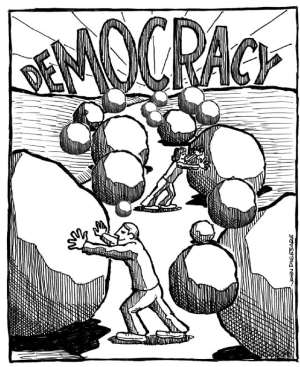
Post colonial Africa in the 1950's and beyond was thronged by one party state whereby the sole purpose was the consolidation of power. The idea was unification of the countries. On the contrary, one party states such as was in Ghana during Nkrumah's time prevented any opposition. Such one party state resulted in the debasement of democratic philosophy of post colonial Africa. This created an avenue for power struggles, the hopelessness of the masses resulted in the military overthrow of those governments and subsequent down turn of democracy in many post colonial African states.
One cannot discuss the West's undermining African traditional political democratic institutions through colonialism without discussing present African democracy. Likewise, continental Africa cannot be studied and classified as a generality. The different religious, ethnic, tribal and language complexities need to be addressed. The truest form of democracy was practiced by the Greeks in classical antiquity. The word democracy was coined from the word demos, meaning 'the people' and kratia 'to rule'. Simply defined, democracy is rule by the majority without trampling the rights of the minority. The basic requirements of democracy begin with the guarantee of basic human rights.
Democracy in present Africa is in a deplorable shape. Post colonial African democracy has been a one step forward two steps backwards journey. Democracy in Africa is either a stalemate, corruption, or one party oligarch states. Obstinate political ideologies and pompous elitist bureaucratic leaders with none fulfilling jargon of peace and progress are also part of the problem. This has partly promoted misgivings and a sense of disenfranchisement amongst many in Africa. For the most part, democracy and socio-economic progress has been all talk and no action.
Although lacking a sense of true democracy in Africa, presently there is a noticeable evolving sociopolitical participation of the masses through education, campaigning and creating social awareness to plight of the less fortunate in African society. Mali a country in the West African hub of the continent has however, really and truly brought to light the fragility of democracy in Africa. This begs the question whether true democracy sustainable in Africa and if so, what type of democratic institutions do we expect to operate in Africa?
Within democratic institutions, there are certain expectations such as divisions of power between government, parliament and courts of law, freedom of speech, press and media as well as recognition of religious liberty. Also, equality to vote, the focal point being public interest and the lack of corruption constitutes the final aspect of democracy as known in Western and European countries.
Considering the multifarious nature of African societies, how can such form of rule exist in such a multifaceted socio-cultural and traditional political atmosphere? In my view, there has to be a cultural definition of democracy in Africa which involves a lived experience rather than theoretical ethos. Traditional political participation of community members in traditional councils is an example of how the social and political structures of African societies operate and still do in different parts of the continent in varying capacities. Hence it is imperative for Africans to know that if true democracy can be applied and practiced in Africa, then democracy will have to transcend political affiliations. Democracy has to be an integral part of people's culture; their daily lived experiences thereby, giving everyone a sense of belonging.
Sustaining democracy is possible in Africa; however, Africans needs to acknowledge and utilize traditional rulers in leadership roles as contributors and participants of democracy. Traditional rulers' roles served as guidance to protect and defend. Integrated in this leadership were the religious, military, and judicial features. African democracy has to take into account the complexities of their respective countries. There is a need of social awareness that democracy as defined and practiced in the West cannot be effectively applied to Africa. African countries need to tailor democracy to their respective countries to make it work. There is a need to identify traditional political systems that can postulate to modern democracy. Therefore, an integration of citizen participation in governance process is needed to give the people a purpose. In other words, if a government is for the people, then the government works towards the interest of the people. Therefore, governments need to take into account the realities of their people and solving the issues pertinent to the survival of their people hereby, making the people the center point in its entire doings.
It is important to note that democracy has never meant the same for everyone. Western democracy as practiced in the United States is different from England. Hence, Africa and Africans need to redefine and re-conceptualize democracy not as the West or Europe sees it, but as how we Africans live it taking note of our unique history and the best our traditional political structures has to offer.
WRITTEN BY BERNADETTE MARY POKU




 We’ll no longer tolerate your empty, unwarranted attacks – TUC blasts Prof Adei
We’ll no longer tolerate your empty, unwarranted attacks – TUC blasts Prof Adei
 Bawumia donates GHc200,000 to support Madina fire victims
Bawumia donates GHc200,000 to support Madina fire victims
 IMF to disburse US$360million third tranche to Ghana without creditors MoU
IMF to disburse US$360million third tranche to Ghana without creditors MoU
 Truck owner share insights into train collision incident
Truck owner share insights into train collision incident
 Paramount chief of Bassare Traditional Area passes on
Paramount chief of Bassare Traditional Area passes on
 Two teachers in court over alleged illegal possession of BECE papers
Two teachers in court over alleged illegal possession of BECE papers
 Sunyani: Victim allegedly shot by traditional warriors appeals for justice
Sunyani: Victim allegedly shot by traditional warriors appeals for justice
 Mahama vows to scrap teacher licensure exams, review Free SHS policy
Mahama vows to scrap teacher licensure exams, review Free SHS policy
 Government will replace burnt Madina shops with a new three-story, 120-store fac...
Government will replace burnt Madina shops with a new three-story, 120-store fac...
